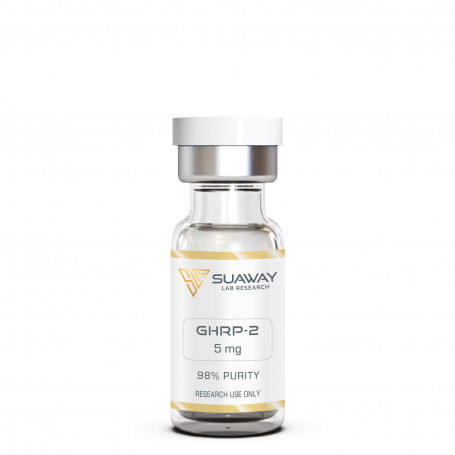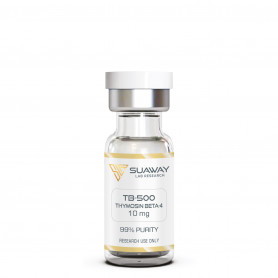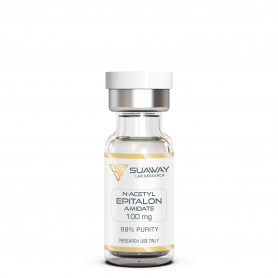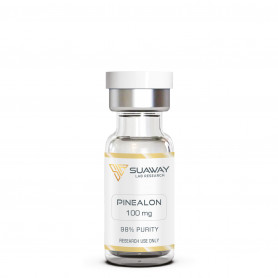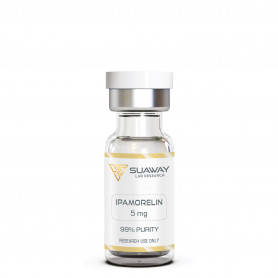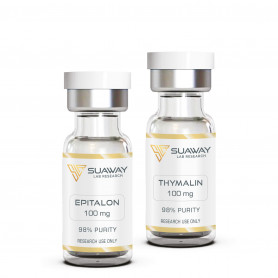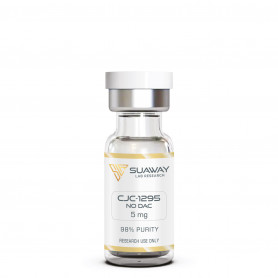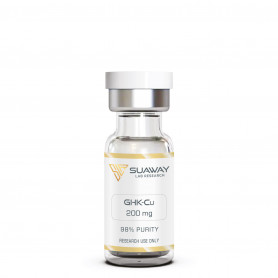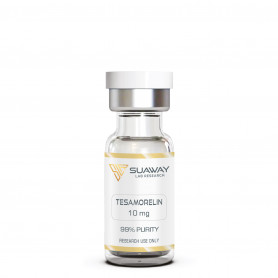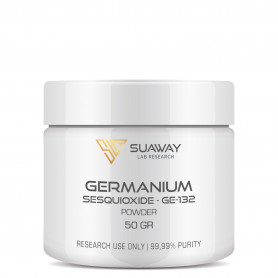Description
STRUCTURE
Sequence: D-Ala-D-2-Nal-Ala-Trp-D-Phe-Lys-NH2
Molecular Formula: C45H55N9O6
Molecular Weight: 817.9749 g/mol
CAS: 158861-67-7
Peptide Purity: Greater than 98%.
Other details: No TFA Salt
Storage: Lyophilized peptide must be stored at -20°C and peptide solution at 4°C.
GHRP-2 has good oral and excellent subcutaneous bioavailability.
DESCRITPION
The growth hormone-releasing peptide-2, also known as GHRP-2, is a hex peptide that acts as a pure growth hormone secretagogue. It is closely linked to the growth hormone-releasing peptide-6, also known as GHRP-6. On the other hand, considering that GHRP-2 is an artificial agonist of ghrelin, it is better. To put it another way, GHRP-2 does not have any negative side effects, such as extreme hunger. The levels of insulin-like growth factor-1 (IGF-1) are increased by GHRP-2, and the impact is magnified when this growth factor is coupled with growth hormone-releasing hormone (GHRH). GHRP-2 is often combined with a GHRH, such as a paginated mechano growth factor (PEG-MGF).
Not only does GHRP-2 cause an increase in the release of ghrelin, but it also plays an important part in the expansion of somatotrophs and the regulation of the synthesis of low-level growth hormone. To put it another way, the structure of this hex peptide makes it ideal for its intended purpose, which is to encourage the pituitary gland to produce more human growth hormone (HGH). As a result of its ability to increase the natural production of HGH inside the body, GHRP-2 is widely regarded as a genuine HGH secretagogue.
Because it is a ghrelin agonist, GHRP-2 is associated with a wide variety of benefits. It improves sleeping patterns, boosts cellular regeneration, and increases bone density in addition to promoting lean body mass and reducing adiposity (decreasing overall body fat). Additionally, GHRP-2 causes an increase in the body's natural production of growth hormones.
It is now being sold as a test peptide for the evaluation of growth hormone deficit and secondary adrenal failure. It was the first of the growth hormone secretagogues to be launched. The effects of GHRP-2 on hunger, muscular development, the immune system, and sleep cycles are all the subject of ongoing study. GHRP-2 has been explored in stage II clinical studies for the evaluation of short stature. It is not necessary to inject GHRP-2 for it to exert its effects since it may exert its activity whether taken orally or sublingually.
According to the findings of the research, there are two methods by which GHRP-2 might stimulate muscle growth: enhanced protein deposition and reduced protein breakdown.
According to the findings of this research, GHRP-2 can slow down the process of muscle wasting by inhibiting the proteins atrogin-1 and MuRF1, which are responsible for controlling the route of muscle breakdown.
According to research, GHRP-2 and its analogs have the potential to aid in the protection of cardiac cells by inhibiting apoptosis, also known as programmed cell death. This is of utmost significance in the aftermath of a heart attack, when cardiac cells are more susceptible to apoptosis as a result of reduced blood flow and, therefore, nutrition delivery.
It has been shown that GHRP-2 may activate the thymus, which is an organ that is important for safeguarding particular immune system cells. In particular, the thymus facilitates the maturation of T lymphocytes. T cells are essential to the development of adaptive immunity. The function of the thymus decreases with age, which causes a multitude of age-related dysfunctions. These dysfunctions range from insufficient tissue repair to decreased immunity, which results in an inability to fight off infections, protect against cancer, and maintain normal tissue function.
It has been shown that GHRP-2 may improve the total amount of time spent sleeping by around 50%, while also increasing the amount of time spent in REM sleep by approximately 20%. Overall, the enhancement in sleep quality led to improvements in cognitive function, blood pressure, the rate of healing, and energy levels. These results, although beneficial to all people, are of utmost significance to the elderly, since the consequences of aging are known to harm the quality of sleep.
REFERENCES
L.T. Phung et al., "The effects of growth hormone-releasing peptide-2 (GHRP-2) on the release of growth hormone and growth performance in swine" [PubMed]
R. Hu et al., "Effects of GHRP-2 and Cysteamine Administration on Growth Performance, Somatotropic Axis Hormone and Muscle Protein Deposition in Yaks (Bos grunniens) with Growth Retardation" [Plos One]
D. Yamamoto et al., "GHRP-2, a GHS-R agonist, directly acts on myocytes to attenuate the dexamethasone-induced expressions of muscle-specific ubiquitin ligases, Atrogin-1 and MuRF1" [PubMed]
G. Muccioli et al., "Growth hormone-releasing peptides and the cardiovascular system" [PubMed]
P. Zeng et al., "Ghrelin receptor agonist, GHRP-2, produces antinociceptive effects at the supraspinal level via the opioid receptor in mice" [PubMed]
B. Laferrère et al., "Obese Subjects Respond to the Stimulatory Effect of the Ghrelin Agonist Growth Hormone-Releasing Peptide-2 on Food Intake" [PMC]
A. Moulin et al., "Recent Developments in Ghrelin Receptor Ligands" [Chemistry Europe]
V. Bodart et al., "Identification and Characterization of a New Growth Hormone–Releasing Peptide Receptor in the Heart" [AHA Journal]
D.D Taub et al., "Rejuvenation of the aging thymus: growth hormone-mediated and ghrelin-mediated signaling pathways" [PubMed]
DISCLAIMER
This product is intendend for lab research and development use only. These studies are performed outside of the body. This product is not medicines or drugs and has not been approved by the FDA or EMA to prevent, treat or cure any medical condition, ailment or disease. Bodily introduction of any kind into humans or animals is strictly forbidden by law. This product should only be handled by licensed, qualified professionals.
All product information provided on this website is for informational and educational purposes only.

